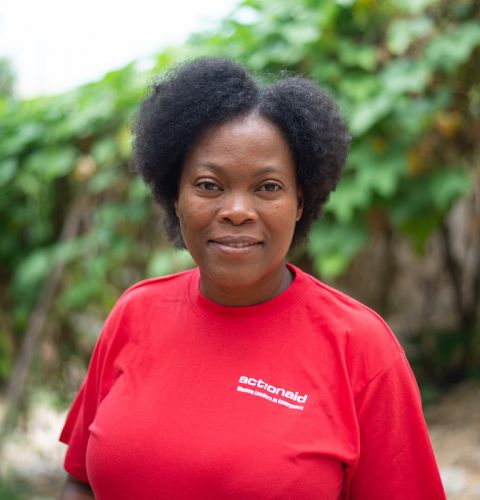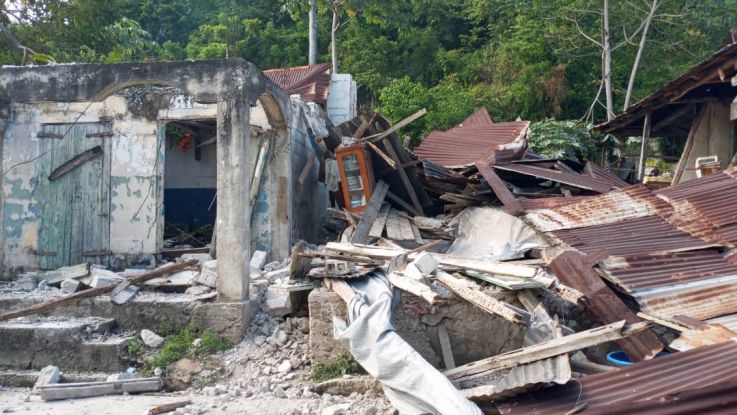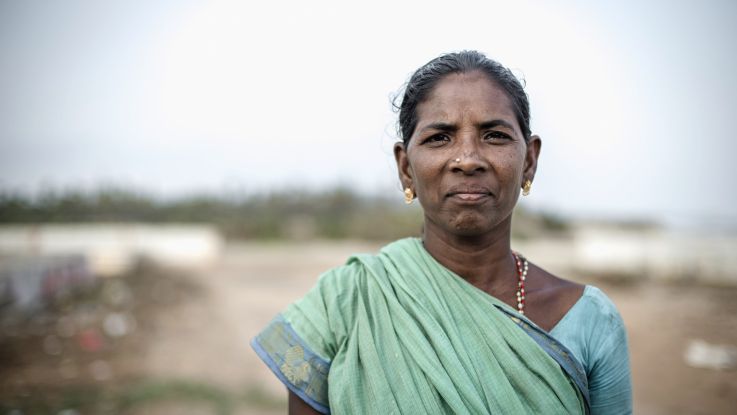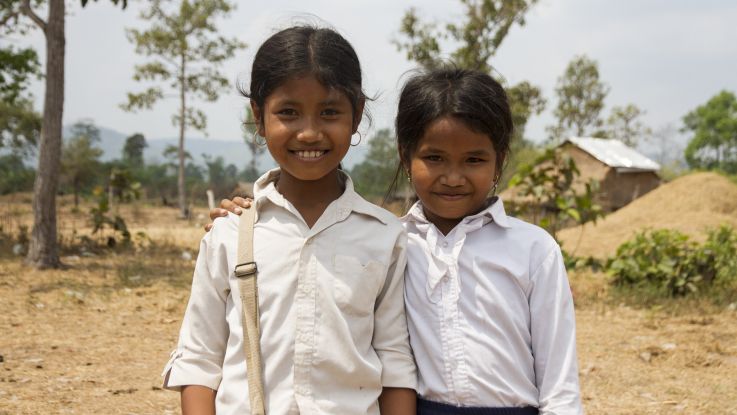Haiti
Why we work in Haiti
The Republic of Haiti is located on the island of Hispaniola in the Caribbean, which also contains the Dominican Republic. In 1804, following a slave revolt, Haiti became the first country in the Caribean and Latin America to end colonial rule.
Chronic instability, dictatorships and disasters in recent decades have left Haiti the poorest country in the Americas. One in two people is undernourished and over half the population live on less than $1 a day – the international poverty line.
An earthquake in 2010 killed more than 300,000 people and caused extensive damage to infrastructure and the economy. Widespread deforestation in Haiti has exacerbated the risk of floods and droughts, which have become more frequent and violent as a result of climate change. This most recent of these occurred in early December 20234, leading to the deaths of four people and more than 6,000 homes being destroyed.
Women's rights in Haiti
Domestic abuse and other forms of violence against women are common in Haiti. Women in Haiti face higher rates of unemployment, are more likely to have poor health, and are less likely to own land or hold political of office than men. However, in 2015 Haiti’s parliament passed an amendment to ensure that at least 30% of all political representatives are women.
Disasters in Haiti
Haiti has experienced a number of disasters in the last decade that have caused significant health, environmental, and economic damage to the country and its people:
- In 2010, Haiti was struck by an earthquake of magnitude 7.0, killing over 300,000 people and injuring over 1.5 million people. After our immediate response providing food and hygiene kits, ActionAid set about training women as first responders for future emergencies.
- In 2016, Hurricane Matthew hit the southeast of Haiti in October 2016, killing over 500 people and displacing over 99,000 families. ActionAid provided first response kits, solar lamps, and psychosocial support to those affected.
- In 2018, Haiti witnessed popular uprisings after the announcement of an increase in fuel prices, corruption scandals, and socio-political and economic instability
- In 2021, Haiti was struck by another earthquake - larger than the earthquake in 2010. Over 2,000 people died, more than 12,000 were injured and around 26,000 people were displaced
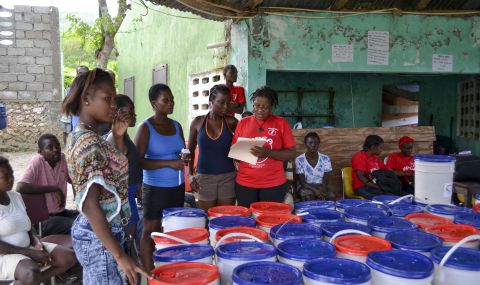
Women leaders from an ActionAid partner organisation in Haiti distribute emergency kits after Hurricane Matthew.
What we do in Haiti
Responding to and building resilience to disasters
Our local staff provided immediate humanitarian relief during Hurricane Matthew in 2016 and the earthquakes of 2010, and the Gustav, Hanna and Ike hurricanes back in 2008. We provide long-term support to help rebuild communities and strengthen their resilience to future disasters.
Local women were and remain in the driving seat, advising on what their communities need and overseeing the distribution of aid to ensure fairness and transparency.
We provided immediate support such as food, water, sanitation and shelter as well as long-term psychosocial support for communities to help them recover.
Fighting for women’s rights
Women and girls are at the heart of everything we do. We believe that supporting women and girls to lead their communities out of poverty is the most effective way of changing lives for good.
That’s why we run women’s groups in Haiti to train women in skills such as women’s rights, conflict resolution, negotiation and running a business.
By empowering groups of women to start their own businesses, they can become less financially dependent on their husbands and afford to send their children to school.
ActionAid’s legal assistance service provides advice and support to survivors of abuse.
Ending hunger
In Haiti, many families don’t have enough to eat. We train women to grow and sell food, own land and withstand the devastating effects of climate change.
In Roseaux region, we teach women fruit and nut processing and conserving skills so they can sell their product for a greater price. ActionAid also supports communities to set up local grinding mills to make it easier and cheaper for local people to make their own our and porridge, rather than relying on overpriced imported foods.
Our savings and loans schemes are also helping struggling farmers to make ends meet. As well as training farmers to diversify and irrigate their crops, communities also receive goats and veterinary training to support healthy herds of livestock.
The El Niño weather phenomenon has made farmers especially vulnerable to food shortages. We’re helping communities to combat drought by providing materials for a rainwater distribution system. This rainwater can also be filtered – in Roseaux region one such system is providing clean drinking water for over 1,200 people.
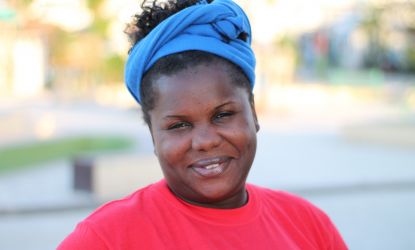
Nadège, 33, runs one of ActionAid community centres and trains young people to help respond to disasters like Hurricane Matthew
ActionAid
Supporting women to lead during emergencies
Nadège is a woman leader running one of ActionAid's community centres. She believes that women should take leadership roles during emergencies, as it can help prevent violence against women and stop women being side-lined in the distribution of emergency supplies.
During ActionAid's response to Hurricane Matthew she helped with distributions, while also training young people to be deployed where their help was needed.
Learn more about our emergency response to Hurricane Matthew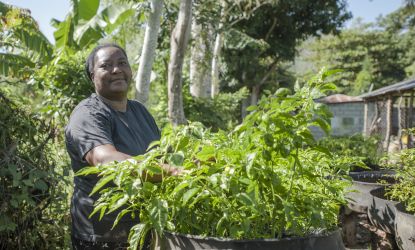
Jacqueline tending peppers in the garden belonging to the women's rights group that she manages, with support from ActionAid
Danielle Peck/ActionAid
Supporting women cooperatives
Jacqueline is a member of an ActionAid-supported cooperative in the Central Plateau region of Haiti.
Together the women grow and process agricultural produce into products they can sell on the local market, including peanut butter and cassava cakes.
Actionaid works with the cooperative to help women increase their income-earning options and develop economic independence.
Donate to support our work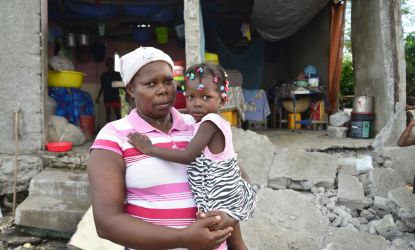
Tessa stands in front of her ruined home after the 2021 earthquake.
Fabienne Douce/ActionAid
Supporting communities after the 2021 earthquake
ActionAid’s emergency teams responded to a 7.2 magnitude earthquake that struck south-western Haiti on Saturday, 14 August, 2021.
Over 2,000 people died, more than 12,000 were injured and around 26,000 people were displaced.
There was significant damage to homes, roads and infrastructure as heavy rains, flooding, and landslides followed just two days after the earthquake struck.
This earthquake was higher in magnitude than the 2010 Haiti earthquake that killed hundreds of thousands of people.
ActionAid responded to those most in need in rural communities in Grand’Anse, in the municipalities of Jérémie and Roseaux. We provided families with first aid emergency kits, tarpaulins, water, cash for food and shelter, hygiene kits, buckets with taps and essential kitchen items.
Learn more about the 2021 earthquakePage updated 29 January 2025
